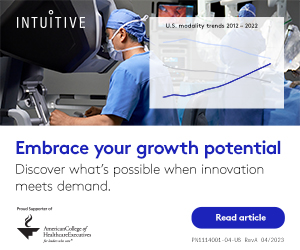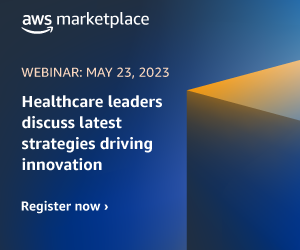
- Program Spotlight:
Today Is Your Last Chance to Register and Save for Next Week's Virtual Leadership Symposium - Speakers Wanted for 2024 Congress
- Explore Career Opportunities With Healthcare Consultant Book Bundle
- Discover Solutions From Management Innovations Presentations
- Racism Is Eating Away at Advancements in Healthcare
- Medicare Coverage of Behavioral Health Integration Services
Program Spotlight:
Today Is Your Last Chance to Register and Save for Next Week's Virtual Leadership Symposium
The challenges today’s healthcare leaders face are manifold; addressing workforce issues, driving quality and performance, and navigating the current regulatory landscape are just a few. Tuesday, May 9, through Wednesday, May 10, gain meaningful insights and updates on trends, solutions and issues in healthcare at the 2023 Virtual Leadership Symposium while earning up to 6 ACHE Face-to-Face Education credits.
During this 1.5-day event, leaders like you can learn from and engage with more than 30 influential voices in healthcare as they address the most pressing issues facing our field today, including the following speakers.
Tuesday, May 9
Join Laurie Santos, PhD, as she kicks off the Virtual Leadership Symposium with the opening session “The Science of Happiness.” Santos, a professor with the Department of Psychology, Yale University, and host of “The Happiness Lab” podcast, will explore what new results in psychological science teach us about being happier, feeling less stressed, and putting these scientific findings into practice.
Wednesday, May 10
Take the first step toward creating a more motivated, engaged and productive healthcare team during “Leadership Insights: Empowering Your Healthcare Team—Strategies for Managing Job Demands and Enhancing Well-being.” Brian R. Spisak, PhD, research associate, National Preparedness Leadership Initiative, Department of Health Policy and Management, Harvard University, and John Whyte, MD, CMO, WebMD, will share how to use self-determination and job-demands resource theories to recognize the individual needs and desires of healthcare workers, and how to align those needs with organizational objectives.
To wrap up the event, Jennifer McCollum, CEO, Linkage, will share insights into creating an inclusive culture during the closing session “Three Critical Levers to Creating an Inclusive Culture.”
Learn more about the 2023 Virtual Leadership Symposium and register today to take advantage of the early bird rate, which ends today.
Speakers Wanted for 2024 Congress
Although the 2023 Congress on Healthcare Leadership just ended, we are already planning for next year. ACHE is accepting speaker proposals for 1-hour or 1.5-hour concurrent sessions at the 2024 Congress, March 25–28, in Chicago. The deadline to submit a proposal is Monday, June 5.
Congress sessions focus on the experiences of healthcare leaders, enterprise decision-makers or those implementing new technologies or processes. Proposals generally should be consistent with that focus and relevant to current trends in healthcare. Additionally, proposals should provide tools and take-aways for participants of that session and not contain commercial content. Learn more and submit your proposal today.
If you have any questions about submitting a proposal for the 2024 Congress, please contact Linda Heath, administrative assistant, ACHE Learn, at lheath@ache.org.
Explore Career Opportunities With Healthcare Consultant Book Bundle
“A career change may be motivated by a push or a pull scenario,” writes Scott A. Mason, DPA, FACHE, in the first chapter of his book Executive Turned Consultant: Transitioning from Experienced Executive to Trusted Advisor in Healthcare. “While both may be present, it is useful to determine which of the two dominate. Under the push scenario, what is the source of dissatisfaction (or failure) with the current situation? … Under the pull scenario, it is important to understand the attraction to consulting as an option.”
Mason’s latest release, along with his earlier book The Healthcare Consultant’s Handbook: Career Opportunities and Best Practices, are now conveniently available as a bundle for the discounted price of $65. This bundle offers a road map for healthcare professionals—both early careerists and executives—who are contemplating a career in consulting. Both books walk readers through key considerations, exploring the essential role of healthcare consultants and what truly makes a consultant exceptional. Mason—a seasoned thought leader in healthcare strategy—shares practical guidance for making informed career decisions about becoming a professional consultant and firsthand accounts of executives who have navigated the transition.
Learn more and order this bundle today.
Discover Solutions From Management Innovations Presentations
This year’s Management Innovations Poster Session at the Congress on Healthcare Leadership showcased presentations that offer solutions to issues in healthcare such as efficiency, patient safety and quality, workforce and more. Visit the 2023 Management Innovations Poster Session webpage to explore the posters and narratives that healthcare leaders shared this year.
Racism Is Eating Away at Advancements in Healthcare
“The damaging effects of racism on the health of Americans of color have been demonstrated in multiple studies going back decades and in anecdotal evidence of generations,” write Douglas Riddle, PhD, DMin, and Gayle L. Capozzalo, FACHE, in a recent ACHE Blog post. In it, they call upon healthcare leaders to “play a greater role in creating a more humane system of healthcare” that does not “allow unfair treatment to continue to be the norm.”
Riddle, curriculum director for The Carol Emmott Foundation, and Capozzalo, executive director of The Equity Collaborative, an initiative of The Carol Emmott Foundation, also offer the following four targets for change:
- Professional growth: Medical caregivers, especially physicians, nurses and licensed mental health professionals, need to reflect the demographics of the communities they serve.
- Practice: Quality and safety improvements need to be targeted at communities of color.
- Practice: Stratify healthcare data collection and analysis in your organization with attention to factors known to reflect marginalization.
- Personal: Mentor and (more importantly) sponsor leaders of color, whose access to advancement and experiences of prejudice and unresponsive systems have left them out in the cold.
Visit ache.org/Blog to read the full post and for more timely and relevant topics trending today in healthcare management.
Medicare Coverage of Behavioral Health Integration Services
Behavioral health integration—incorporating behavioral health with primary care—is an effective strategy to improve mental, behavioral or psychiatric health for many patients. As such, Medicare covers two types of behavioral health integration services, according to the Centers for Medicare & Medicaid Services. They are:
- The Psychiatric Collaborative Care Model approach: Providers should use CPT codes 99492–99494 and HCPCS code G2214 to bill.
- General behavioral health integration services using models of care other than the Psychiatric Collaborative Care Model: Providers should use CPT code 99484 and HCPCS code G0323 to bill.
CMS makes separate payment to physicians and nonphysician practitioners for services they supply over a calendar month service period. Eligibility is based on the clinical judgement of the billing practitioner. Eligible conditions include mental health; behavioral health, including substance use disorder; and psychiatric.
Read Behavioral Health Integration Services to learn more, including information about service components or parts, and requirements for initiating a visit, supervision and advance consent.
For more information, visit the following webpages: Addressing & Improving Behavioral Health and Care Management.


